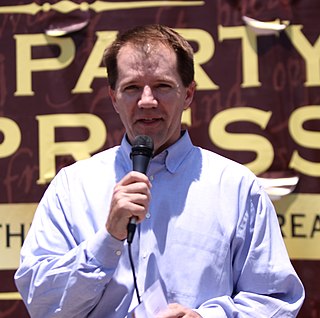A Quote by Marco Rubio
Our government does not exist to decide the rights, nor to grant them. Our government exists to protect them. And that is why we have a constitution that limits the power of the federal government to a few specific, but important things and we have abandoned that. We have abandoned it in both political parties.
Related Quotes
The Constitution was written to protect individual freedom and limit the ability of the government to encroach upon it. The liberals don't like that. The Democrats are very unhappy. The Constitution limits government too much. So they want to rewrite it, have a second Bill of Rights. So they want a new Bill of Rights that spells out what government can do instead of a Bill of Rights that tells government what it can't do.
We, the People of this country, have no unalienable rights... all our rights are subject to modification... the Constitution of the United States of America is nothing more than a piece of paper and... our government should not be restrained by the Constitution because our government can do good things for people.
We have reached a moment in our history where we think that every problem in America has to have a federal government solution. Every problem in America does not have a federal government solution. In fact, most problems in America do not have a federal government solution and many of them are created by the federal government to begin with.
The people who started the American government, the founders of the Constitution, didn't like political parties but they were forced to start them. Nobody ever created political parties in England, they evolved. And there do tend to be two general tendencies that focus around how much government you think you need.
Our Constitution exists to secure individual freedom, the essential condition of human flourishing. Liberty is not provided by government; liberty preexists government. It's our natural birthright, not a gift from the sovereign. Our founders upended things and divided power to enshrine a promise, not a process.
I see,... and with the deepest affliction, the rapid strides with which the federal branch of our government is advancing towards the usurpation of all the rights reserved to the States, and the consolidation in itself of all powers, foreign and domestic; and that, too, by constructions which, if legitimate, leave no limits to their power... It is but too evident that the three ruling branches of [the Federal government] are in combination to strip their colleagues, the State authorities, of the powers reserved by them, and to exercise themselves all functions foreign and domestic.
Our form of government does not enter into rivalry with the institutions of others. Our government does not copy our neighbors', but is an example to them. It is true that we are called a democracy, for the administration is in the hands of the many and not of the few. But while there exists equal justice to all and alike in their private disputes, the claim of excellence is also recognized; and when a citizen is in any way distinguished, he is preferred to the public service, not as a matter of privilege, but as the reward of merit
Until the 1930s, the Constitution served as a major constraint on federal economic interventionism. The government's powers were understood to be just as the framers intended: few and explicitly enumerated in our founding document and its amendments. Search the Constitution as long as you like, and you will find no specific authority conveyed for the government to spend money on global-warming research, urban mass transit, food stamps, unemployment insurance, Medicaid, or countless other items in the stimulus package and, even without it, in the regular federal budget.
But America was founded on the principle that every person has God-given rights. That power belongs to the people. That government exists to protect our rights and serve our interests. That we shouldn’t be trapped in the circumstances of our birth. That we should be free to go as far as our talents and work can take us.
But America was founded on the principle that every person has God-given rights. That power belongs to the people. That government exists to protect our rights and serve our interests. That we shouldn't be trapped in the circumstances of our birth. That we should be free to go as far as our talents and work can take us.





























